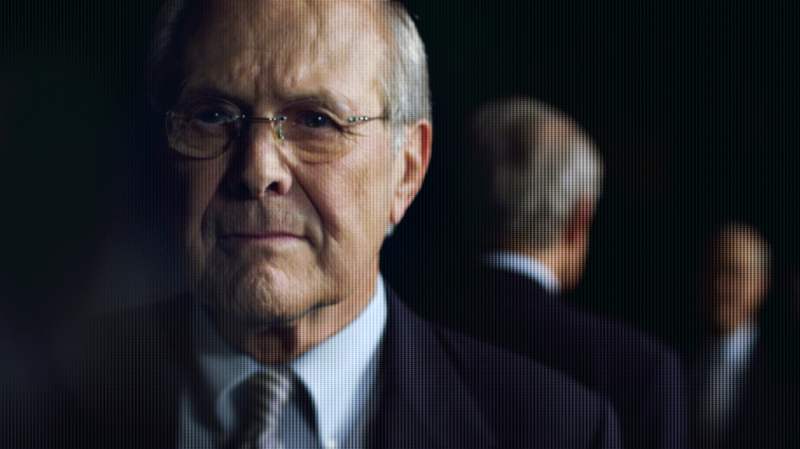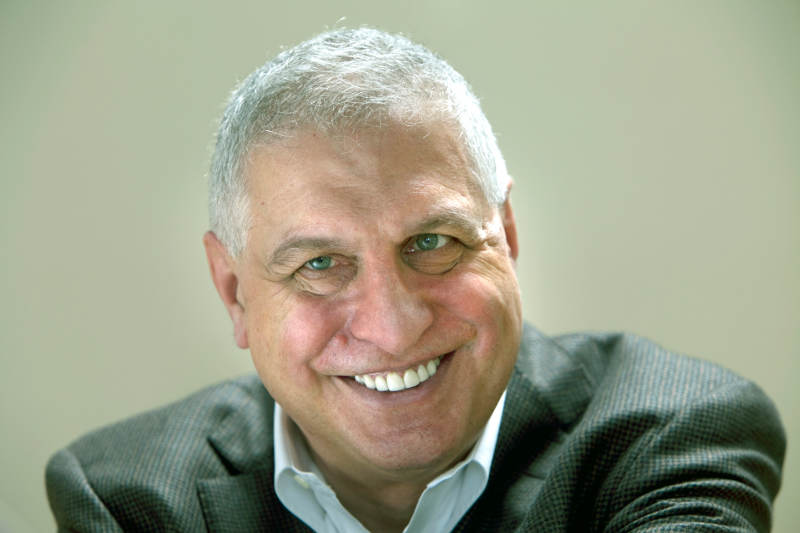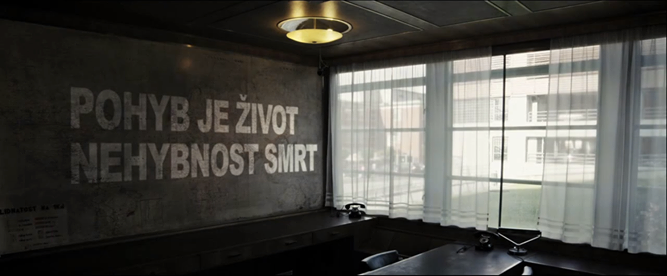The Unknown Known Donald Rumsfeld
The charming United States Secretary of Defense from Bush‘s administration and a matador of American politics Donald Rumsfeld returns to key moments of his political career in prose full of metaphors. The story, which he tells in Errol Morris’s new film, is considered incomplete by many. “Maybe there just isn’t anything to discover,” argues Alexandr Vondra, former Defense Minister and diplomat, one of the attendees of the situational review dedicated to the film The Unknown Known (2014), which has its Czech premier at the IDFF Jihlava. His partners in discussion were senator and former Home Secretary František Bublan and political science graduate and editor in chief of the comment portal A2larm, Jaroslav Fiala. The discussion was moderated by Daniel Anýž, commentator of Hospodářské noviny.
JF: The film The Unknown Known unveils a key figure in American politics – Donald Rumsfeld and provides him with the opportunity to speak to all motives, which led to the decision concerning the war on terrorism and the invasion of Iraq. It is interesting. However, I hoped that Errol Morris would be more confrontational, especially in matters, which are controversial. He lets Rumsfeld talk too much. Without denial, one has to state that Rumsfeld is convincing, but at the same time capable of setting the tone and direction of the discussion and if necessary, disowning everything.
FB: I do not think that Rumsfeld is someone, who is definitely convinced of the righteousness of the steps he took. He often reflects and at times it appears as if he himself is second-guessing his decisions and is trying to convince himself that he was right. The play on words, which the film title bares - The Unknown Known - itself suggests a certain uncertainty. However, Rumsfeld emphasizes that he had to make some kind of a decision and that is where he sees his political role.
AV: I agree, that there were many occasions where the film could have been more confrontational. Today no one holds against Rumsfeld the fact that he went to war, but the fact that he underestimated its first stage. He led a war at a time when it was agreed that with the help of technology, you are able to accomplish everything. Perhaps more than the failure of intelligence services, the American invasion is marked by the disproportional faith in the miraculous power of modern technology to avoid human casualties. In Rumsfeld’s memos, often referred to as “snowflakes”, we can find his explanation to why Americans are going to Iraq so lightly equipped, which only confirms this belief. It would be interesting to confront Rumsfeld on this topic after a decade, but sadly, this topic is missing in the film.
JF: In this context I thought Morris’s previous film was better- a portrait of former U.S. Secretary of Defense McNamara from the time of the American invasion in Vietnam – The Fog of War (2003), which was more critical and covered the topic in-depth.
AV: It is difficult to compare these two films from Morris. McNamara spoke about the Vietnam War after a long time, while Rumsfeld was suppose to talk about a recent topic. In the movie he appears to be more humble than when giving press conferences, where as the Secretary of Defense, he played a key part in the Iraq war and he had to defend the decision made by the government. At the same time he stands behind what he did. The whole movie is threaded with an attempt to put responsibility where it lies.

The Unknown Known
Political Documentary
FB: The film reminded me of situations I experienced as Home Secretary. After September 11th, we debated what we would do in the event that a plane should disappear from Ruzyně and would be flying on course to the Prague castle. At the time it was apparent how a couple of ministers were hesitating to give an answer- they didn’t want to decide on the matter. I appreciate how Rumsfeld owns up to his responsibility, however difficult it may be to do so.
JF: To my mind Morris’s documentary is a testimonial to the public’s failure, where it was not capable of demanding convincing evidence of the need to invade Iraq from the government. During press conferences Rumsfeld appeared to be decisive, a person, who needs to defend his politics, even if based on very questionable, if not false material. The public let themselves be driven into a corner by his speaking skills, as did Morris.
AV: I think this is a different way of making a political documentary. For the asking a question is given- and that is all. I would want to live to see documentaries being made here, where the creator does not insert his own ideological views of the word, but lets the subjects speak. Of course I’d also want to live to see the day when politicians here, are willing to speak and are willing to be exposed.
FB: Documentarians or journalists here usually have some kind of a script laid out in advance. They know in advance where the discussion is supposed to lead and what kind of a conclusion it will have. They try to lead the subject into a certain script with their questions. I enjoyed the fact that Morris really leaves the whole matter open, he only tried to get Rumsfeld to talk more. It is apparent that there was no set ending to the film.
JF: I, on the other hand, value a subjective take and the creators input of his own political or ideological views into a documentary. I respect Morris’s approach, but at the same time it is prone to being flawed in the false notion that politicians act in a moral fashion, “a politician knows better, that’s why we should let him have a chance to defend himself”. A politician is a public figure, who is obligated to the public and the documentarian plays the part of being some kind of a critic for the public. A politician should not only answer for something to the public, but should answer to it.

Errol Morris
From Pearl Harbor to Vietnam
FB: In my opinion Morris’s documentary does not only lend itself to American political history, but also to its present and future. A lot of confessions concerning the failure of information services were made and also about a lack of imagination. Bearing in mind the current situation and problems with the Islamic state, it is important to avoid making mistakes. When I worked in the intelligence service, I noticed how difficult it was to put oneself in the position of Arabs, who have a different kind of mentality, different philosophy, and different way of thinking about time, human life and so on. Americans assume that how they think, must be the way the rest of the world thinks. In doing so they are making a huge mistake. First we must deepen our knowledge of the Islamic world and its history. Only then are we able to do something.
JF: The imagination is capable of comprehending a lot of things, basically anything. Iraq, for me, is an example of an “unknown known” which can be abused, used to manipulate the public, create fear, and raise concerns. After 9/11 thoughts like these fell on fertile soil. It is known, that a politician who sows feelings of danger, greater than would be necessary, has the public on his side. He can point out enemies, which the public will turn on. Imagination is a risk factor in my opinion.
AV: The West, enlightened from Iraq, decided not to intervene. The Islamic state was founded in Syria and spread to Iraq, where there was a vacuum. Most of all the Americans can be blamed for pulling out of Iraq before their work was over.
JF: The question of waging a war is not an easy one for a democratic country. You need to gain internal support, but also deal with the effects. A democratic country has the advantage of self-reflection, enlightenment. Although America is militarily still the strongest, it cannot wage wars on many fronts. It is unsustainable. In a way the war in Iraq can be considered another American “Vietnam”- the same blind stab in a region where the American military interference largely contributed to destabilization.
AV: Countries, which have great responsibilities, are at risk of taking on too much. This is precisely what happened in the case of Vietnam and it appears that the situation is repeating itself. In the beginning of the conflict there was Pearl Harbor, but in the end, unfortunately, it looked more like Vietnam.
JF: That is the tactic of terrorists. An attack with civilian casualties will evoke an asymmetrical reaction. Bin Laden dragged the USA into a conflict, which drained it and stripped it of the legitimacy it enjoyed after the cold war. The manner in which America or other countries meddled in matters of foreign countries, and the reality, that they always engaged with giants of the Middle East, where they wanted to somehow control natural resources is still being omitted from discussion. The West will have to reflect more on these matters.
FB: This brings us back to Morris’s film, which was an invitation to self-reflection in the case of Donald Rumsfeld. However, the politician comes to the conclusion that what he did was correct. I am not convinced whether he wanted to persuade the viewing audience of this or himself.
Translated by Floriana Skorulska



